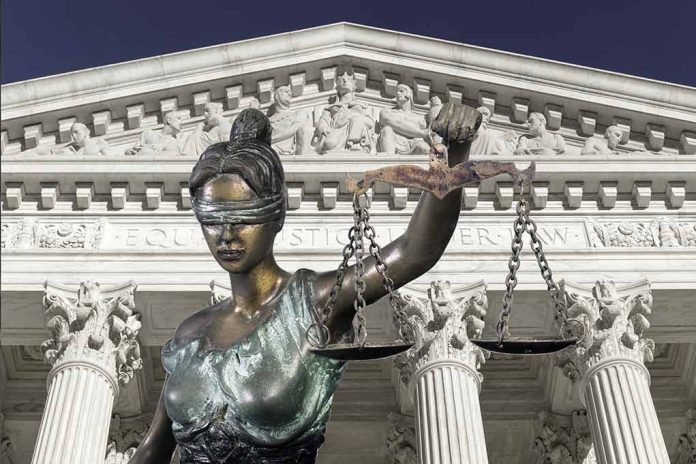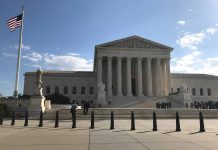
Justice Clarence Thomas faces mounting pressure to recuse himself from cases amid controversy surrounding his wife’s political communications.
At a Glance
- Virginia “Ginni” Thomas, wife of Justice Thomas, sent messages to conservative groups urging efforts to overturn the 2020 election
- Critics argue Justice Thomas’s participation in related cases could undermine public trust in the judiciary
- Demands for recusal highlight ongoing debate about judicial integrity and ethical concerns
- Legal experts are divided on whether a justice’s spouse’s political activism necessitates recusal
Controversy Surrounding Ginni Thomas’s Communications
The Supreme Court finds itself at the center of a heated debate as Justice Clarence Thomas faces increasing calls to step aside from certain cases. The controversy stems from text messages and communications allegedly sent by his wife, Virginia “Ginni” Thomas, to conservative organizations and Trump administration officials. These messages, which emerged in the aftermath of the 2020 presidential election, have raised questions about potential conflicts of interest and the integrity of the nation’s highest court.
According to reports, Ginni Thomas sent numerous text messages to then-White House Chief of Staff Mark Meadows, urging efforts to overturn the 2020 election results. These communications occurred during a critical period between the election and the January 6 Capitol attack, a time when the nation’s democratic processes were under intense scrutiny.
Inbox: @JudiciaryDems call on Justice Clarence Thomas to recuse himself from any case involving the Christian conservative legal org First Liberty Institute following @propublica report last week that his wife Ginni Thomas praised them for opposing Supreme Court ethics reform. pic.twitter.com/plQdueVECK
— Benjamin S. Weiss (@BenjaminSWeiss) September 9, 2024
Ethical Concerns and Public Trust
The revelation of these messages has ignited a firestorm of criticism from legal experts and politicians alike. Critics argue that Justice Thomas’s participation in cases related to the 2020 election or the January 6 events could potentially undermine public confidence in the judiciary’s objectivity. The situation has brought to the forefront longstanding concerns about the boundaries between personal relationships and professional duties within the highest echelons of the American legal system.
“I’m not sure how I would have come out if we just had a lot of texts from her saying that ‘this is terrible,'” said Amanda Frost, a law professor at American University in Washington. “But she wasn’t doing just that,” Professor Frost said. “She was strategizing. She was promoting. She was haranguing.”
This assessment from Professor Frost highlights the crux of the ethical dilemma. It’s not merely that Ginni Thomas expressed political views, but that she actively engaged in efforts to influence the outcome of the election, which many see as crossing a line that could compromise her husband’s impartiality on related matters before the court.
Calls for Recusal and Political Fallout
In light of these revelations, prominent Democrats have called for Justice Thomas to recuse himself from cases related to the 2020 election and the events of January 6. Senator Ron Wyden of Oregon went so far as to state that “Justice Thomas’ conduct on the Supreme Court looks increasingly corrupt” in light of the reports about his wife’s activities.
“The reported comments by Ginni Thomas are deeply problematic,” said Senate Judiciary Committee chairman Sen. Dick Durbin, D-Ill., in a statement Monday. “She’s testified before Congress that she and Justice Thomas do not discuss each other’s work. That defense now rings hollow. Whether she’s inflating her knowledge of judges’ views on ethics reform or telling the truth, her apparent comments on behalf of judicial officers create a clear appearance of impropriety for Justice Thomas.”
These statements from leading Democratic lawmakers underscore the political dimensions of the controversy and the potential impact on the Supreme Court’s public standing. However, it’s important to note that Justice Thomas has previously declined to address recusal demands, and the decision to recuse ultimately lies with the individual justice.
Broader Implications for Judicial Ethics
The controversy surrounding Justice Thomas and his wife’s political activities has reignited discussions about the need for a more robust ethics code for Supreme Court justices. While the court recently adopted a code of conduct, critics argue that it lacks an enforcement mechanism and does not adequately address situations like the one currently facing Justice Thomas.
As the debate continues, the American public is left to grapple with fundamental questions about the impartiality of the judiciary and the proper balance between a justice’s personal life and professional responsibilities. The outcome of this controversy could have far-reaching implications for how the Supreme Court operates and is perceived by the public for years to come.
Sources:
- Justice Thomas Ruled on Election Cases. Should His Wife’s Texts Have Stopped Him?
- Justice Clarence Thomas faces new recusal demand after wife’s alleged message to conservative group
- Democrats urge Clarence Thomas to recuse himself after wife’s texts
- What to know about the Justice Clarence Thomas recusal debate around his wife’s texts
- Democrats call on Justice Clarence Thomas to recuse himself from Jan. 6 cases due to his wife’s texts









